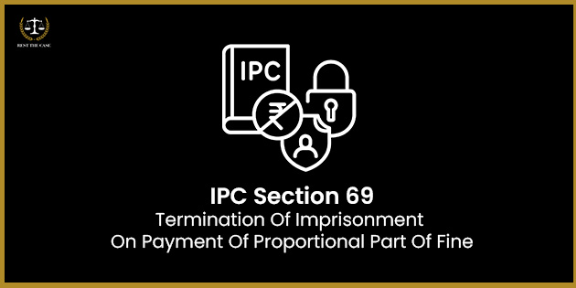IPC
IPC Section 69 -Termination Of Imprisonment On Payment Of Proportional Part Of Fine

In criminal cases where courts impose both a fine and imprisonment in default of payment, a question often arises – what happens if the convict cannot pay the entire fine but manages to pay a part of it? Should they still serve the full term of imprisonment, or can they get relief proportionately?
The answer lies in Section 69 of the Indian Penal Code (IPC). This provision ensures fairness by reducing the imprisonment in proportion to the fine amount that has been paid.
We will cover in this blog:
- The legal text and meaning of IPC Section 69
- Simplified explanation with practical examples
- Purpose behind this provision
- How it works with Sections 63–68
- Judicial interpretation
- Relevance in the modern legal system
- Common questions answered
Legal Text of IPC Section 69
Section 69 – Termination of imprisonment on payment of proportional part of fine
“If, before the expiration of the imprisonment fixed in default of payment, any part of the fine be paid or levied, such part of the imprisonment shall terminate as bears to the whole the same proportion as the part paid or levied bears to the whole fine.”
Simplified Explanation
This means that if a person is imprisoned for non-payment of a fine, partial payment of the fine will reduce the imprisonment proportionately.
Example: If a fine of ₹3,000 is imposed with 3 months’ imprisonment in default, and the offender pays ₹1,500 (half), then imprisonment will reduce by half (1.5 months). So, Section 69 acts as a middle path, it does not force the convict to serve the full sentence if some part of the fine is paid.
Practical Example
Suppose the court imposes a fine of ₹6,000 on Ramesh with 6 months’ default imprisonment under Section 67.
- If Ramesh pays nothing, he serves 6 months.
- If he pays ₹3,000 (half), his imprisonment reduces to 3 months.
- If he pays ₹4,500 (three-fourths), his imprisonment reduces to 1.5 months.
- If he pays the full ₹6,000, he is released immediately (as per Section 68).
This ensures justice and proportionality in punishment.
Purpose of IPC Section 69
- Prevents imprisonment from becoming excessive or unfair when partial fine is paid.
- Balances between deterrence and fairness.
- Provides convicts with an incentive to pay whatever amount they can arrange, instead of serving the whole imprisonment.
- Reduces unnecessary burden on prisons.
- Aligns with the principle that default imprisonment is coercive, not punitive.
How It Works with Other Sections?
- Section 63 – Defines amount of fine.
- Section 64 – Allows imprisonment in default of payment.
- Section 65 – Limits default imprisonment when both fine and imprisonment are imposed.
- Section 67 – Provides imprisonment in default for fine-only offences.
- Section 68 – Full termination of imprisonment on payment of fine.
- Section 69 – Proportional termination of imprisonment on partial payment of fine.
Thus, Sections 68 and 69 together act as relief provisions, ensuring that imprisonment does not exceed the unpaid portion of the fine.
Judicial Interpretation
Courts have clarified that:
- Default imprisonment is only a means to secure payment, not a punishment in itself.
- If partial fine is paid, imprisonment must proportionally reduce – otherwise it would amount to double punishment.
In Shaik Khader v. State of Andhra Pradesh, the court reiterated that once fine is paid (fully or partly), imprisonment must reduce accordingly.
Other High Court rulings have held that jail authorities must calculate the reduced imprisonment immediately once part of the fine is deposited.
Modern Relevance
IPC Section 69 remains highly relevant today, especially in:
- Traffic challans & petty offences, where people may pay partly in installments.
- Municipal violations, like encroachment fines.
- Economic & white-collar offences, where large fines are imposed.
- Cases of financially weaker offenders, ensuring they don’t face unnecessary long jail terms just because they can’t pay the full fine at once.
Conclusion
IPC Section 69 provides a fair and humane balance between punishment and liberty. It ensures that imprisonment in default of fine is strictly proportionate to the unpaid amount, preventing over-punishment. Together with Section 68, it reinforces the idea that default imprisonment is a coercive tool, not an independent punishment. For accused persons, this provision offers relief, flexibility, and an opportunity to secure liberty by arranging even partial payment.
Frequently Asked Questions
Q1. Does IPC Section 69 apply to both simple and rigorous imprisonment?
Yes, but default imprisonment is generally simple. The proportional reduction applies regardless.
Q2. Can someone be released earlier if they pay part of the fine midway?
Yes, the imprisonment reduces in proportion to the fine paid.
Q3. What if the convict pays almost all the fine but not the full amount?
They will still serve imprisonment only for the unpaid portion.
Q4. Can a family member pay part of the fine on behalf of the convict?
Yes, payment by relatives or friends is valid and will reduce the imprisonment accordingly.
Q5. Is the release automatic after part payment of the fine?
Yes, once the court/jail confirms the amount, the convict must be released after serving the proportionate term.






